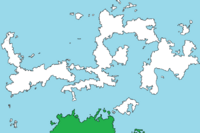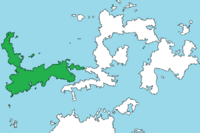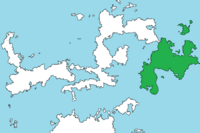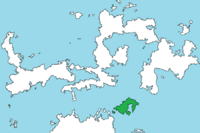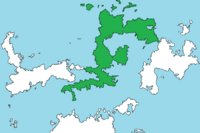Continent of Ibica
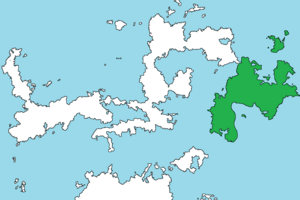 | |
| Area | 24,709,000 km2 (9,540,000 sq mi) |
|---|---|
| Population | 592,296,233 |
| Demonym | Ibican |
| Countries | 5 sovereign states |
| Dependencies | 3 non-sovereign territories |
| Languages | English, Spanish, French |
| Time zones | UTC+7 to UTC+10 |
Ibica is a continent entirely within the Eastern Hemisphere of Terra Ceralis. It is bordered to the north and east by the Coresian Ocean, to the south by the Bosphorus Ocean, and to the west by the Black Sea. A narrow isthmus connects Ibica with the Continent of Ostria at the continents northwestern most point in Pherigo.
Ibica was reached by its first human populations approximately 40,000 to 17,000 years ago. The so-called Paleo-Ibican period is taken to have lasted until about 10,000 years ago (the beginning of the Archaic or Meso-Ibican period). The classic stage spans roughly the 6th to 13th centuries.
Extent
"Continental Ibica", as a term distinct from "Ibica", excludes Cheirol, Haviland, and Edward Island.
Countries, territories, and dependencies
| Flag | Country or territory | Capital | Area | Population | Population density |
|---|---|---|---|---|---|
| Belmonte | Belmonte City | - Sq Mi | 3,196,073 | -/Sq Mi | |
| Federal States of Calejo | Calejo City | 531,523 Sq Mi | 40,699,287 | 76.57/Sq Mi | |
| United Kingdom of Cheirol | Delacroix | 379,119 Sq Mi | 33,352,584 | 87.71/Sq Mi | |
| Pherigo | Charleston | 352,079 sq mi | 30,375,607 | 86.27/Sq Mi | |
| United States of Ibica | Willmington | 2,281,053 sq mi | 81,398,185 | 35.68/Sq Mi |
Natural characteristics
Geography
There are numerous islands off the continent's coasts; principally, the Cheirol Archipelago, Haviland, Edward Island, and James Island. The vast majority of Ibica is on the Ibican Plate.
The continent can be divided into four great regions (each of which contains many subregions): the Central Ibican Plain stretching from the Bay of Ibica to the Bay of Albion; the geologically young, mountainous west, including the Madison Mountains; the raised but relatively flat plateau of the Ibican Highlands in the northwest; and the varied eastern region, which includes the Georgia Range, the coastal plain along the Cortesia seaboard, and the Angola peninsula.
Cities
The top ten largest Ibican cities by population as of 2020, based on national census numbers from national authorities.
| Metro Area | Population | Country |
| Elizabeth City | 4,586,394 | Ibica |
| Rhone | 3,495,495 | Ibica |
| Franklin | 2,938,495 | Ibica |
| Charleston | 2,825,358 | Pherigo |
| Olympia | 1,829,394 | Ibica |
| St. Clarke | 1,493,293 | Ibica |
| Parkland | 1,290,029 | Ibica |
| Lafayette | 1,008,298 | Ibica |
| Panterra City | 930,482 | Pherigo |
| Talbert | 748.932 | Pherigo |
| Willmington | 734,123 | Ibica |
| Columbia | 674.378 | Ibica |
| Baton Rouge | 653,938 | Ibica |
Economy
| Rank | Country or Territory | GDP (nominal) millions of USD |
|---|---|---|
| 1 | 6,620,300 | |
| 2 | 2,237,000 | |
| 3 | 1,613,828 | |
| 4 | 1,362,637 | |
| 5 | 117.008 |
Ibica, Pherigo, and Cheirol have significant and multifaceted economic systems; while Calejo is classed as a developing economy, and Belmonte is split between tourism, and oil. Ibica has the largest economy in the world. In 2020, Ibica had an estimated per capita gross domestic product of $53,396, and is the most technologically developed economy on the continent.
Culture
The cultures of Ibica are diverse. Ibica and Cheirol have many cultural similarities, while French-speaking Cartier has a distinct culture.


